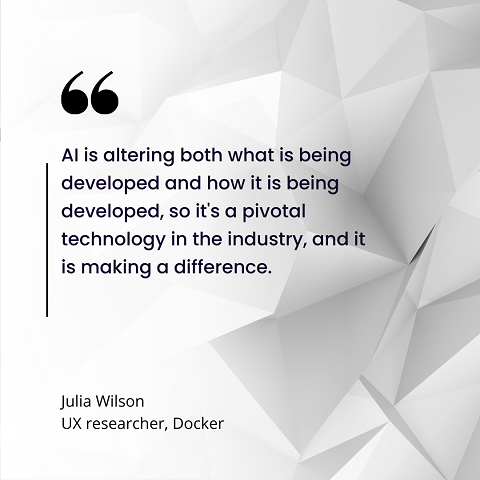Application Development Landscape Is Rapidly Evolving, Docker Survey Finds
Docker's 2024 State of Application Development Report highlights industry shifts toward AI and microservices.

The world of application development has changed significantly in recent years as new demands and trends have reshaped the IT landscape.
This week Docker, a leading provider of cloud-native application development tools, released its 2024 State of Application Development Report. The comprehensive study, now in its second year, offers an in-depth look at the current landscape of software development, based on insights from more than 1,300 respondents.
The report's key findings paint a picture of an industry undergoing significant transformation, driven by the rapid adoption of disruptive technologies and evolving development methodologies.
Among the top highlights:
Cloud development on the rise: While 64% of respondents still primarily develop locally, a notable 36% are shifting to non-local environments, such as ephemeral or preview environments, personal remote dev environments, and tools like GitHub Codespaces, Gitpod, and Coder.
AI/ML integration going mainstream: 64% of respondents are now using AI tools like ChatGPT, GitHub Copilot, and Gemini for tasks such as code writing, documentation, and research.
Microservices adoption accelerating: Nearly three times more respondents are transitioning from monolithic architectures to microservices than the reverse, indicating a clear trend toward more modular, scalable application designs.
Security remains a challenge: Despite the industry's emphasis on shift-left security practices, 34% of respondents rated security tasks as difficult, and 25% are seeking better tools for security and vulnerability remediation.
"It's a monumental task to continuously innovate in such a rapidly changing industry," Julia Wilson, UX researcher at Docker and a co-author of the report, told ITPro Today.

"The real challenge is working to support developers in most effectively taking advantage of the disruptive technology and tools at their disposal — including cloud development environments, AI, and security tools that make shifting left easy."
Security Remains a Primary Issue for Application Developers
For Wilson, the biggest surprise was the collection of findings around security.
Specifically, she noted that a shift-left of security is clearly happening. The concept of shift-left is that security happens earlier in the development process, rather than at the end of it. Wilson commented that only 14% of respondents viewed security shifting left as an important trend.
Moreover, security-related tasks were perceived as generally difficult, and one of the top areas where respondents wanted better tools.
"All together, this suggests the shift-left is ongoing but is facing barriers," she said. "It might not be happening in exactly the right way yet, leading to frustration."
Wilson added that it's undeniably critical to address security issues early. At the same time, she said shifting left has to be approached with particular consideration for the tools available to make the change easy, or else it may result in more burden on developers — meaning more time they have to spend away from the code itself.
The Impact of AI on Application Development
Perhaps the most hyped trend of 2024 is AI, and it's a trend that is also having a clear impact on application development.
"AI is altering both what is being developed and how it is being developed, so it's a pivotal technology in the industry, and it is making a difference," Wilson said.
Many core development processes may be changing as more professionals start working with machine learning, she said. In fact, the report found that 46% of respondents are using AI in some capacity."AI tools for development are helping developers to automate tasks that otherwise may have taken up quite a bit of their time," Wilson said. "This allows them to spend more time on complex and creative efforts, allowing for faster development cycles."
About the Author
You May Also Like








.jpg?width=700&auto=webp&quality=80&disable=upscale)
